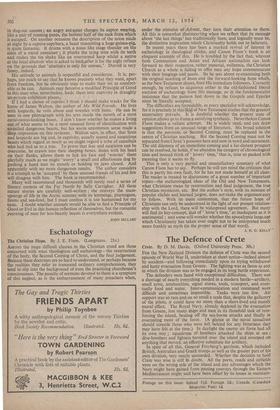Eschatology
The Christian Hope. By J. E. Fison. (Longmans. 21s.) AMONG the we difficult clauses in the Christian creed are those concerned with what theologians call eschatology—the resurrection of the body, the Second Coming of Christ, and the final judgement. Because these doctrines are so hard to understand, or perhaps because the realities they refer to transcend ordinary comprehension, they tend to slip into the background of even the practising churchman's consciousness. The paucity of sermons devoted to them is a symptom of this neglect, as is the embarrassment, of many preachers when,
under the stimulus of Advent, they turn their attention to them. All this is somewhat disconcerting when we reflect that its message about 'the last things' has traditionally been, and logically must be, the distinctive inspiration which Christianity holds out to believers.
In recent years there has been a marked revival of interest in eschatology in theological circles, and Canon Fison's book is an eloquent example of this. He is troubled by the fact that, whereas both Communists and Asian and African nationalists can look forward to their respective, rather material, millennia, the Christian Church as a whole is failing to offer men any hope commensurate with their longings and needs. So he sets about re-examining both the original teaching of Jesus and the forward-looking hope which, as the New Testament shows, fired His immediate followers. Correctly enough, he refuses to acquiesce either in the old-fashioned liberal excision of eschatology from His message, or in the fundamentalist insistence that the pattern laid down in the Gospels and Epistles must be literally accepted.
The difficulties are formidable, as every specialist will acknowledge, for it is precisely in this field of New Testament studies that the greatest uncertainty prevails. It is doubtful whether the present state of opinion allows us to frame a satisfying synthesis. Nevertheless Canon Fison makes a. valiant attempt. He is widely ready and can draw suggestions from an unusual range of literature. His broad solution is that the parousia, or Second Coming, must be replaced in the centre of Christian teaching. Bin the Second Coming must not be separated from Christ's presence here and now in word and sacrament. The old dilemma of an immediate coming and a far-distant prospect can be resolved, he holds, if we abandon the category of chronological time and instead think of ' lovers' time,' that is, time so packed with meaning that it seems to fly.
This is only a very partial and unsatisfactory summary of what Canon Fison has to say. Perhaps he will not mind the criticism that this is partly his own fault, for he has not made himself at all clear. The reader is treated to discussions of a great number of important topics—the eschatological ideas of the Old and New Testaments, what Christians mean by resurrection and final judgement, the true Christian mysticism, etc. But the author's style, with its mixture of popular clichds and learned jargon, does not make the argument easy to follow. With its main contention, that the future hope of Christians can only be understood in the light of our present relation- ship with the Lord, there will be widespread agreement. But many • will find its key-concept, that of lover's time,' as inadequate as it is sentimental ; and some will wonder whether the apocalyptic langLage which Christianity has taken over ought not to be interpreted much more frankly as myth (in the proper sense of that word).
J. N. D. KELLY -










































 Previous page
Previous page